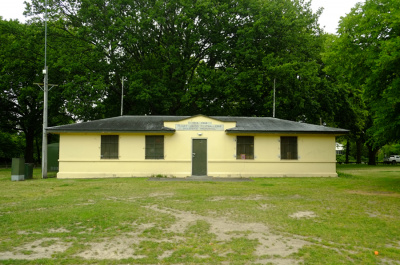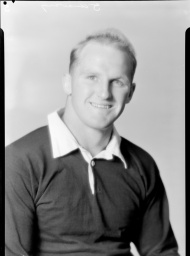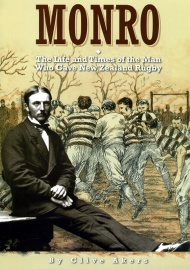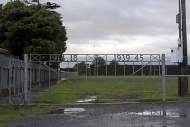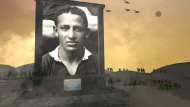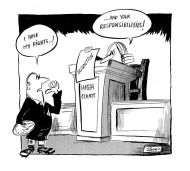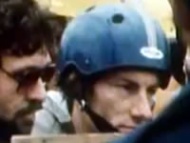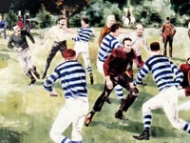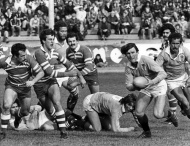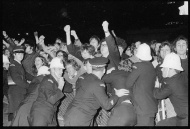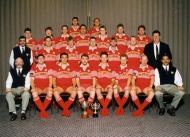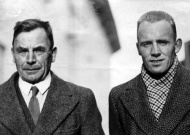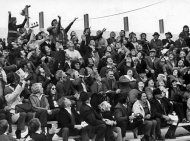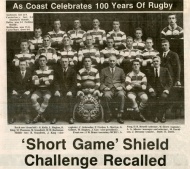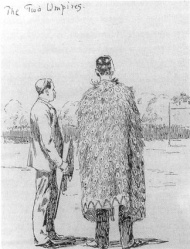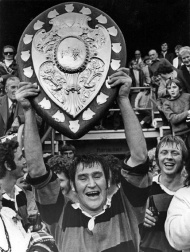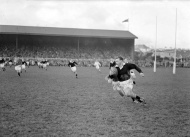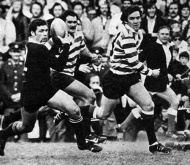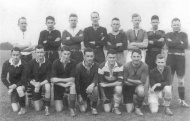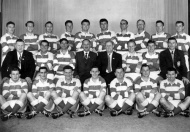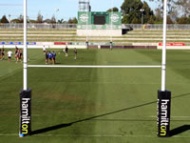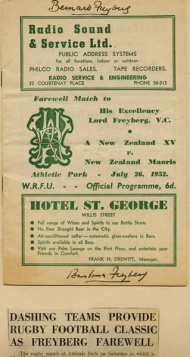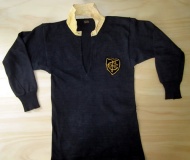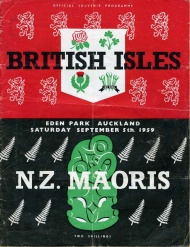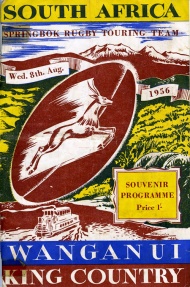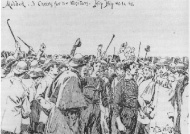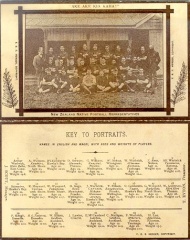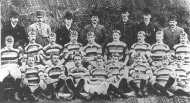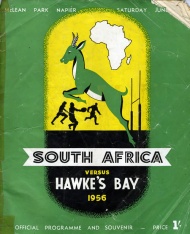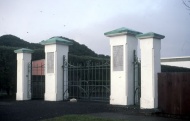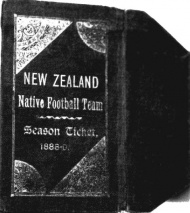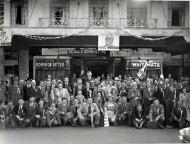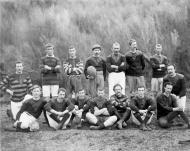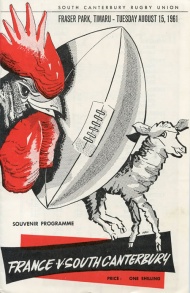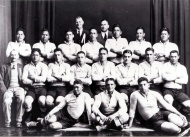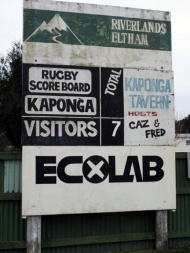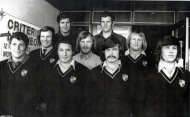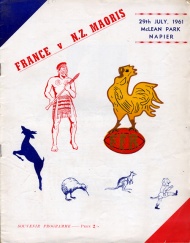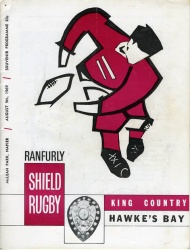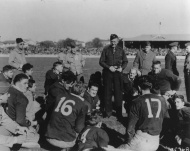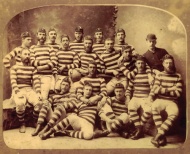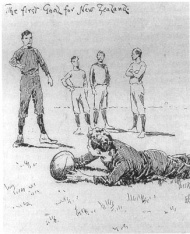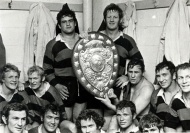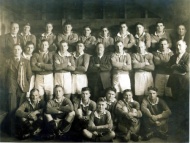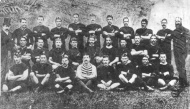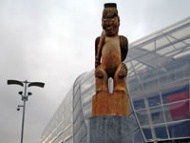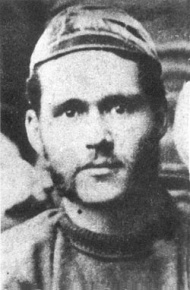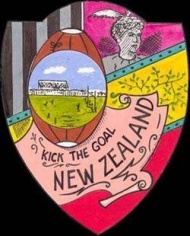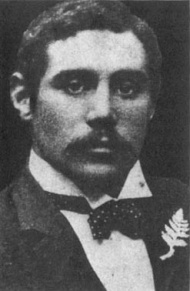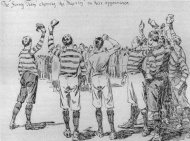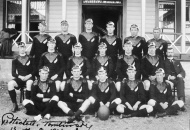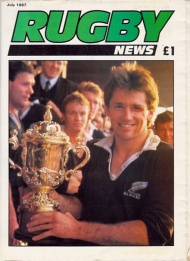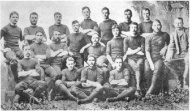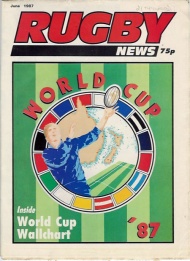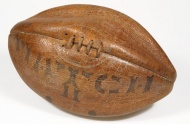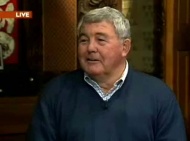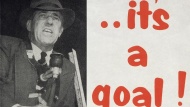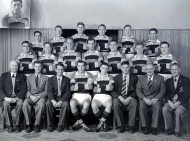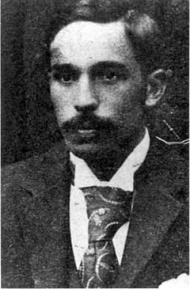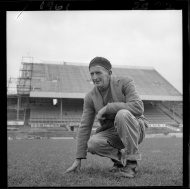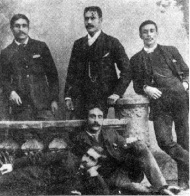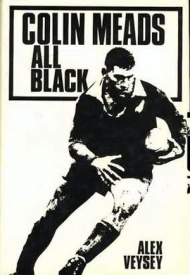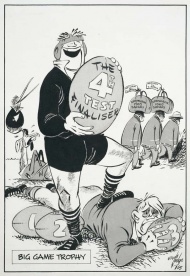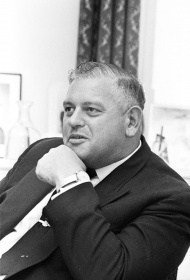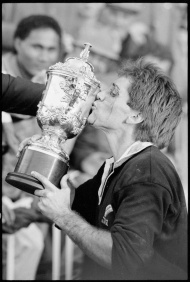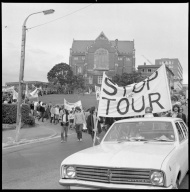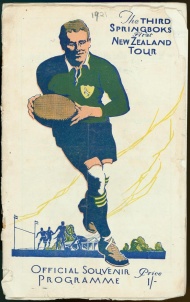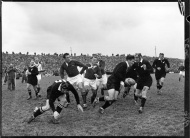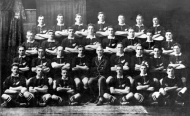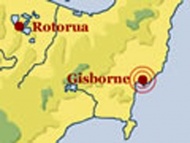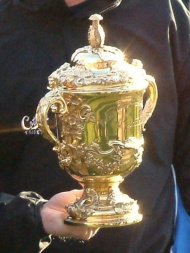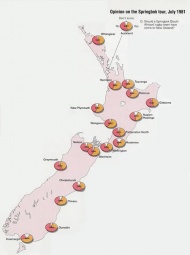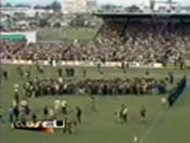Events In History
-
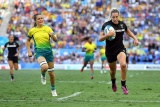 15 April 2018Black Ferns Sevens win Commonwealth gold
15 April 2018Black Ferns Sevens win Commonwealth goldNew Zealand rugby sevens team turned the tables on 2016 Olympic champions Australia, winning a thrilling final at Robina Stadium on the Gold Coast in extra time. Read more...
-
 23 October 2011All Blacks win their second Rugby World Cup
23 October 2011All Blacks win their second Rugby World CupThe All Blacks won the Webb Ellis Cup for the second time in seven attempts, defending grimly to hold onto an 8–7 lead over France in front of 61,000 spectators at Eden Park, Auckland. Read more...
-
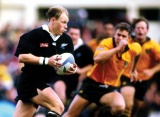 10 August 1995News Corporation's rights to professional rugby bolstered
10 August 1995News Corporation's rights to professional rugby bolsteredAll Blacks Josh Kronfeld and Jeff Wilson signed contracts with the New Zealand Rugby Football Union (NZRFU), heralding the victory of Rupert Murdoch over Kerry Packer in a battle for the right to televise professional rugby. Read more...
-
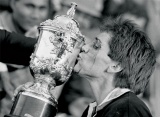 20 June 1987All Blacks win the first World Cup
20 June 1987All Blacks win the first World CupWith Michael Jones, John Kirwan and David Kirk scoring tries, the All Blacks defeated France 29–9 at Eden Park, Auckland. Kirk became the first captain to lift the Webb Ellis Cup. Read more...
-
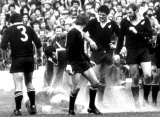 12 September 1981'Flour-bomb test' ends Springbok tour
12 September 1981'Flour-bomb test' ends Springbok tourThe third and deciding rugby test at Eden Park, Auckland, is best remembered for the flares and flour bombs dropped onto the playing field. Outside the ground, violence erupted on an unprecedented scale. Read more...
-
 29 July 1981Police baton anti-tour protesters outside Parliament
29 July 1981Police baton anti-tour protesters outside ParliamentUp to 2000 anti-Springbok tour protesters were confronted by police who used batons to stop them marching up Molesworth St to the home of South Africa's Consul to New Zealand Read more...
-
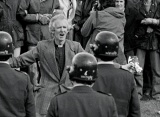 25 July 1981Anti-Springbok protesters block Hamilton match
25 July 1981Anti-Springbok protesters block Hamilton matchAnti-tour demonstrators invaded Hamilton’s Rugby Park, forcing the abandonment of the Springboks–Waikato match. Read more...
-
 11 November 1978Andy Haden dives to save rugby test
11 November 1978Andy Haden dives to save rugby testWith two minutes to play in a rugby test match against Wales, All Black lock Andy Haden flung himself sideways in an attempt to secure a match-winning penalty. Read more...
-
 10 April 1973Labour government cancels Springbok rugby tour
10 April 1973Labour government cancels Springbok rugby tourFollowing police warnings of civil strife, Prime Minister Norman Kirk informed the New Zealand Rugby Football Union that the government saw ‘no alternative’ to a 'postponement' of the planned tour by the South African Springboks. Read more...
-
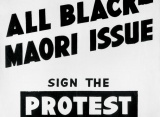 10 May 1960All-white All Blacks leave for South Africa
10 May 1960All-white All Blacks leave for South AfricaDespite protests, the controversial rugby tour went ahead. The issue of sporting ties with South Africa would eventually split the country in 1981. Read more...
-
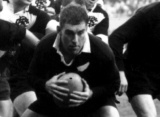 3 June 1936Colin 'Pinetree' Meads born
3 June 1936Colin 'Pinetree' Meads bornThe legendary All Black lock was a physically tough, uncompromising player. Rugby writer Lindsay Knight described Colin Meads as New Zealand's equivalent of Australia's Sir Donald Bradman or American Babe Ruth as a sporting legend. Read more...
-
 9 August 1930George Nepia plays last All Blacks test
9 August 1930George Nepia plays last All Blacks testNepia was one of the stars of the 1924-5 All Blacks, playing in all 32 matches on the team's tour of the British Isles, France and Canada. He played the last of his nine tests in 1930, against the British Lions. Read more...
-
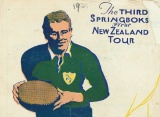 7 September 1921Springboks play New Zealand Māori for first time
7 September 1921Springboks play New Zealand Māori for first timeA South African journalist was outraged when white spectators supported the New Zealand Māori rugby team playing the touring Springboks at Napier. Read more...
-
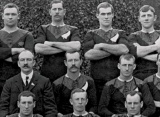 16 December 1905All Blacks' non-try hands Wales historic win
16 December 1905All Blacks' non-try hands Wales historic winA great rugby rivalry was born when a try by All Black Bob Deans was disallowed, resulting in the only loss of the ‘Originals’ tour. Read more...
-
 16 September 1905'Originals' kick off All Black tradition
16 September 1905'Originals' kick off All Black traditionThe first fully representative New Zealand rugby team to tour the northern hemisphere was known as the ‘Originals’. They won 34 of their 35 matches and popularised both the haka and the ‘All Blacks’ nickname. Read more...
-
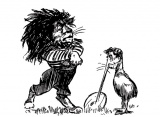 20 August 1904First use of kiwi as unofficial national symbol?
20 August 1904First use of kiwi as unofficial national symbol?The New Zealand Free Lance printed a J.C. Blomfield cartoon in which a plucky kiwi morphed into a moa as the All Blacks defeated Great Britain 9–3 in the first rugby test between Motherland and colony. This may have been the first use of a kiwi to symbolise the nation in a cartoon. Read more...
-
 16 April 1892NZ Rugby Football Union founded
16 April 1892NZ Rugby Football Union foundedAs rugby grew in popularity in New Zealand, it became necessary to standardise the administration of the game in the colony. Despite some opposition, a New Zealand Rugby Football Union was founded. Read more...
-
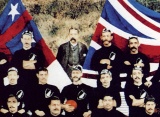 3 October 1888New Zealand Natives team plays first game in UK
3 October 1888New Zealand Natives team plays first game in UKThe privately organised rugby team was the first to wear the silver fern and an all-black uniform. Read more...
-
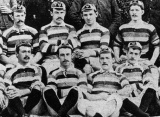 28 April 1888First British rugby tourists take the field
28 April 1888First British rugby tourists take the fieldThe first British rugby team to tour New Zealand played its first match, against Otago, at Dunedin’s Caledonian Ground in front of 10,000 spectators. Read more...
-
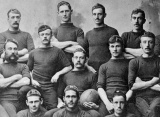 22 May 1884First New Zealand rugby team in action
22 May 1884First New Zealand rugby team in actionThe first representative New Zealand rugby team played its first match, defeating a Wellington XV 9-0 before embarking on a tour of New South Wales. Read more...
-
 14 May 1870First game of rugby played in NZ?
14 May 1870First game of rugby played in NZ?Around 200 people were on hand at Nelson’s Botanic Reserve to watch a game of football played under Rugby rules. Read more...
-
 19 June 1869First game of rugby played in NZ?
19 June 1869First game of rugby played in NZ?The first game of football in New Zealand played under Rugby rules may have been a match between Whanganui Town and Countr at suburban Aramoho on Saturday 19 June 1869 Read more...
Articles
Natives' Rugby Tour, 1888-89

The title of 'The Originals' was bestowed on the next New Zealand rugby team to tour Britain, that of 1905-6, but even though it was soon forgotten, the Natives' tour was to have enduring significance for New Zealand rugby and society.
-
Page 2 – Rugby in 1888
The rugby played by the Natives was different from the game we know today.
-
Page 3 – Maori and rugby
In 1872, 'Wirihana' became the first recorded Maori rugby player when he turned out for Wanganui
-
Page 4 – Preparations
In the absence of any body regulating the game in New Zealand, Eyton was free to promote a tour of Britain as a private venture
-
Page 5 – The 'Noble Maori' arrive
After playing nine matches in New Zealand and two in Melbourne in the southern winter of 1888 (with only two losses), the Natives set off for Britain by steamer.
-
Page 6 – Daily routines
Between their first and last matches in Britain, the Natives played on average every 2.3 days.
-
Page 7 – Unsporting behaviour?
Although hacking and tripping had been banned in the 1870s to make the game safe enough to appeal to gentlemen, rugby remained dangerous.
-
Page 8 – Natives and northerners
In 1888 the gentlemen who ran the Rugby Union (and the Empire) were based in southern England, and the England test was played in London. Yet the playing strength of the
-
Page 9 – Rugby and society
What effect did the Natives' tour have on rugby and wider New Zealand society? It showed that New Zealanders could compete on equal terms with representatives of the imperial
-
Page 10 – Matches played
Games and scores Total (rugby games only): played 107: won 78, drew 6, lost 23 Points for: 772; Points against: 305 In Britain: played 74: W49, D5, L20 Points for: 394; Points
-
Page 11 – Further information
This web feature was written by David Green and produced by the NZHistory.net.nz team. Books
Sport, 1940-1960
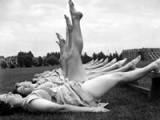
The mid-century decades brought more mass participation in sport, the consolidation of many national competitions, and greater achievement at international level.
- Page 1 - Sport in New Zealand 1940-1960 The mid-century decades brought more mass participation in sport, the consolidation of many national competitions, and greater achievement at international
1981 Springbok tour
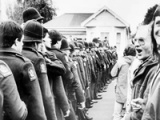
For 56 days in July, August and September 1981, New Zealanders were divided against each other in the largest civil disturbance seen since the 1951 waterfront dispute. The cause of this was the visit of the South African rugby team – the Springboks.
-
Page 2 – All Blacks versus Springboks
Since rugby went professional in 1995 countries like Australia, England and France have challenged New Zealand and South Africa's claims to be the two powerhouses of world
-
Page 3 – Politics and sport
South Africa's apartheid policies and attitudes created obvious problems for New Zealand rugby, given the prominence of Māori in the sport.
-
Page 4 – Stopping the 1973 tour
Keeping sport and politics separate was becoming increasingly difficult. In July 1969 HART (Halt All Racist Tours) was founded by University of Auckland students with the
-
Page 5 – Gleneagles Agreement
The All Blacks accepted an invitation to tour South Africa in 1976, when world attention was fixed on the republic because of the Soweto riots.
-
Page 6 – Battle lines are drawn
Tour supporters were determined that the first Springbok visit to New Zealand since 1965 would not be spoiled. The anti-tour movement was equally determined to show its
-
Page 7 – Tour diary
Select itinerary of the 1981 tour by the Springbok rugby team.
-
Page 8 – Impact
In Hamilton the protesters occupying the pitch had chanted 'The whole world is watching'. The same applied to New Zealand as a nation. Some believed the tour was an opportunity
1987 Rugby World Cup
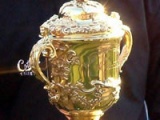
In a country where rugby became a surrogate for religion, hosting and then winning the first Rugby World Cup was a big deal. The story of how the tournament came about mixes the worlds of sport, politics and money.
-
Page 2 – Origins of international rugby
Before the 1987 Rugby World Cup and the professional era, rugby prided itself on extolling the virtues of friendly rivalry.
-
Page 3 – The long road to the cup
There were many obstacles along the road to the first Rugby World Cup.
-
Page 4 – Organising the tournament
The Rugby World Cup was set to take place in May or June 1987, and two venues in Australia and eight in New Zealand would hold games.
-
Page 5 – A world cup at last
With the staging of the Rugby World Cup, rugby had established itself as a commercial market, and the financial viability of the world cup concept was assured.
-
Page 6 – Further information
This web feature was written by David Green and produced by the NZHistory.net.nz team. Links The 1987 Rugby World Cup includes match statistics for all games
Regional rugby
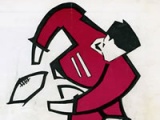
The passion and parochialism of provincial rugby helped give the game a special place in New Zealand’s social and sporting history. Read brief histories, highlights and quirky facts about each of New Zealand's 26 regional rugby teams.
-
Page 2 – Overview
General overview of regional rugby in New Zealand, including timeline and table showing changes in scoring values
-
Page 3 – Provincial competitions
Overview of the Ranfurly Shield, the National Provincial Championship and other regional rugby competitions
-
Page 4 – Northland rugby
History and highlights of rugby in the Northland region
-
Page 5 – North Harbour rugby
History and highlights of rugby in the North Harbour region
-
Page 6 – Auckland rugby
History and highlights of rugby in the Auckland region
-
Page 7 – Counties Manukau rugby
History and highlights of rugby in the Counties Manukau region
-
Page 8 – Waikato rugby
History and highlights of rugby in the Waikato region
-
Page 9 – Thames Valley rugby
History and highlights of rugby in the Thames valley region
-
Page 11 – King Country rugby
History and highlights of rugby in the King Country region
-
Page 12 – Taranaki rugby
History and highlights of rugby in the Taranaki region
-
Page 13 – East Coast rugby
History and highlights of rugby in the East Coast region
-
Page 14 – Poverty Bay rugby
History and highlights of rugby in the Poverty Bay region
-
Page 16 – Whanganui rugby
History and highlights of rugby in the Whanganui region
-
Page 18 – Horowhenua Kapiti rugby
History and highlights of rugby in the Horowhenua region
-
Page 19 – Wairarapa Bush rugby
History and highlights of rugby in the Wairarapa region
-
Page 20 – Wellington rugby
History and highlights of rugby in the Wellington region
-
Page 22 – Tasman rugby
History and highlights of rugby in the Tasman region
-
Page 21 – Buller rugby
Highlights from Buller rugby history
-
Page 23 – West Coast rugby
History and highlights of rugby in the West Coast region
-
Page 24 – Canterbury rugby
History and highlights of rugby in the Canterbury region
-
Page 25 – Mid Canterbury rugby
History and highlights of rugby in the Mid Canterbury region
-
Page 26 – South Canterbury rugby
History and highlights of rugby in the South Canterbury region
-
Page 27 – North Otago rugby
History and highlights of rugby in the North Otago region
-
Page 28 – Otago rugby
History and highlights of rugby in the Otago region
-
Page 29 – Southland rugby
History and highlights of rugby in the Southland region
-
Page 30 – Best year ever?
Join the debate about the best year in the history of your region's rugby team
-
Page 31 – Further information
Further reading about New Zealand's regional rugby history
Māori rugby timeline
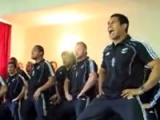
This timeline covers some of the key events and major players in the history of Māori rugby. It was compiled to mark the centenary of the first official New Zealand Māori team.
-
Page 2 – Further information
Links and books for further reading about Maori rugby
Life in the 20th century
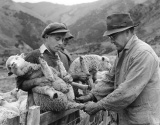
Exploration of everyday life in New Zealand from 1900 to the mid-1980s
- Page 6 - AppearancesWe present ourselves to the world by the way we dress and wear our hair. Whether we have carefully selected from a full wardrobe or simply grabbed the first thing at hand, our
Biographies
-
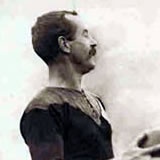 Gallaher, David
Gallaher, David
Dave Gallaher was captain of the 1905 ‘Originals’ rugby team, the first to be known as the All Blacks. His death while fighting overseas during the First World War ensured that he acquired a mystique that transcended sport.
Read more... -
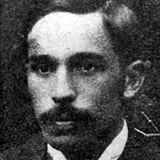 Ellison, Thomas Rangiwahia
Ellison, Thomas Rangiwahia
Tom Ellison was captain of NZ's first official rugby team in 1893. He invented the wing forward position and in 1903 wrote one of the game's first coaching manuals.
Read more... -
 Warbrick, Joseph Astbury
Warbrick, Joseph Astbury
Joe Warbrick was the captain, coach and selector for the New Zealand Natives' tour of Britain in 1888-89, the first New Zealand representative rugby team to tour beyond Australia.
Read more... -
 Meads, Colin Earl
Meads, Colin Earl
In 1999 Colin Meads was named as New Zealand's Player of the Century and the International Rugby Hall of Fame rated him ‘the most famous forward in world rugby throughout the 1960s’.
Read more... -
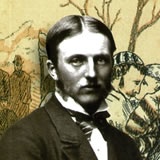 Monro, Charles John
Monro, Charles John
Nelson-born Charles Monro was credited with introducing rugby to New Zealand.
Read more... -
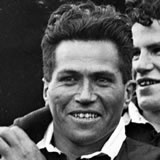 Nēpia, George
Nēpia, George
George Nēpia is considered to be one of New Zealand rugby’s finest players. He played all 32 matches for the famous 1924-25 ‘Invincibles’ on their tour of the British Isles, France and Canada.
Read more... -
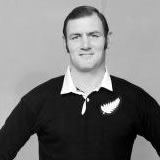 Lochore, Brian James
Lochore, Brian James
Wairarapa born and bred, Brian James (BJ) Lochore won distinction as a player and administrator at school, club, provincial and national level.
Read more... -
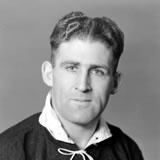 Allen, Frederick Richard
Allen, Frederick Richard
Described as an ‘immaculate player’, Allen went on to become the most successful All Black coach ever.
Read more... -
 Whineray, Wilson James
Whineray, Wilson James
The great New Zealand rugby writer T.P. McLean declared ‘unhesitatingly’ that Wilson (‘Noddy’) Whineray was New Zealand’s ‘greatest captain’.
Read more... -
 Alley, Geoffrey Thomas
Alley, Geoffrey Thomas
Geoffrey Alley was an All Black lock and a farmer, and then became involved in adult education and library services.
Read more... -
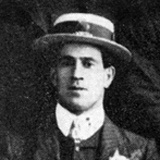 Asher, Albert
Asher, Albert
Albert Asher was a dual international rugby union and rugby league player.
Read more... -
 Asher, Ernest Te Kepa
Asher, Ernest Te Kepa
Ernie Asher was a prominent Māori rugby league player and sports administrator
Read more... -
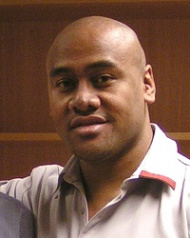 Lomu, Jonah
Lomu, Jonah
Jonah Lomu (1975-2015) was the first – and remains the only – rugby player to achieve worldwide fame.
Read more...
Related keywords
- christchurch
- famous firsts
- maori sport
- all blacks
- wilson whineray
- fred allen
- suffrage 125
- commonwealth games
- rugby league
- albert asher
- ernest asher
- brian lochore
- nelson city
- charles monro
- world cup
- rongotea
- WW1 stories
- south africa
- sport
- 1980s
- cartoon
- springboks
- protest
- napier
- george nepia
- hawkes bay rugby
- roadside stories
- otago region
- eden park
- northland
- joe morgan
- apartheid
- 1970s
- west coast
- southland region
- canterbury
- ranfurly shield
- south canterbury rugby
- west eyreton
- wairarapa rugby
- east coast rugby
- wellington city
- athletic park
- ron jarden
- whanganui city
- bill osborne
- statistics
- westport
- waikato
- hamilton
- governor-general
- bernard freyberg
- clothing
- libraries
- geoffrey alley
- football
- king country
- colin meads
- north harbour rugby
- waitara
- manawatu rugby
- raurimu
- france
- ashburton
- mid canterbury rugby
- newtown
- auckland city
- kaponga
- olympics
- counties rugby
- national identity
- poverty bay rugby
- american forces
- taranaki
- buller
- cricket
- WW2
- winston mccarthy
- war objects
- joe warbrick
- bay of plenty rugby
- fashion
- australia
- thames valley rugby
- alcohol
- david kirk
- north african campaign
- rotorua
- haka
- norman kirk
- robert muldoon
- silver fern
- racism
- gisborne
- radio broadcasts
- empire day
- italian campaign
- north otago rugby
- tom ellison
- levin
- te ati awa
- ngati moehau
- lawyer
- maori land court
- coromandel town
- thames
- david gallaher
- ponsonby
- masterton
- publishing
- writing
- blenheim
- tasman
- whakatane
- music
- invercargill
- 1960s
- workers rights
- otorohanga
- te kuiti
- jonah lomu
- new plymouth
- webb ellis
- maps
- dunedin
- victoria university
- manakau
- WW1
- mascots
- riots
- police
- western front
- passchendaele offensive
- 1920s
- 1950s
- timeline
- songs
- music month
- howard morrison
- HART
- demonstrations
- labour party
- gleneagles agreement
- united nations
-
Main image: Rugby Union Footballers Soldiers Memorial

